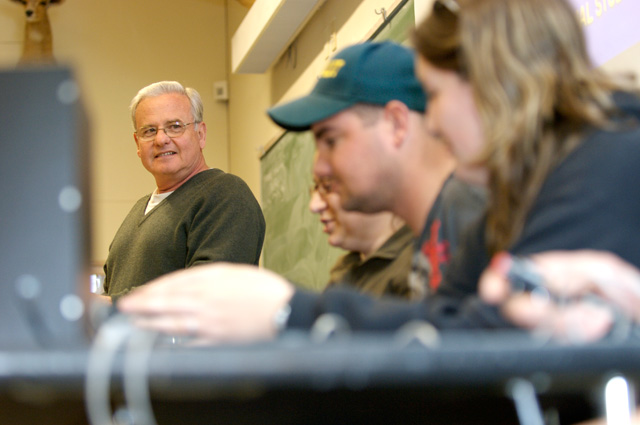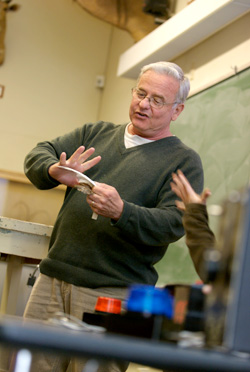
And if you’re at the National Wildlife Quiz Bowl, the pressure at a steadily rolling boil, and you buzz in with “glycogen,” you might just walk away with the national title.
As coach and faculty advisor to the Wildlife Conclave, Kitchen has helped his students win a string of national victories—a total of six in the last eight years of competition. In that time his office has become so cluttered with plaques and awards that soon he’ll have to rearrange the Wildlife Building’s bird room to clear space for them all.
The team earned their most recent victory at the 2008 National Wildlife Quiz Bowl in Tucson, Ariz. As is usually the case, it wasn’t a matter of merely winning. They trounced the competition, which included schools like Purdue and Texas Tech. In Tucson, HSU’s average margin of victory was about 130 points, based on a total of 620 points scored versus the opponents’ total of 90.
Training for the competition is intense. It begins in Kitchen’s Wildlife 480, an elective course open to students of any major. Typically around 40 students enroll in the class, but only half end up going to the bowl. Kitchen makes sure the subject matter is as close to what working wildlife professionals encounter in the field and that, he says, can be a bit daunting for freshmen and sophomores not used to the scope of the material. Students are routinely quizzed on the subjects one would expect: wildlife policy, biology, mammalogy, ornithology and herpetology. But questions about chemistry, physics, math and statistics are thrown in to keep students on their toes.
In many ways, participating in the conclave is the perfect preparation for the higher-level courses in the Wildlife major.
“The new students are overwhelmed by the density of the subject matter, but the seniors are there, many of whom are experts themselves, to help them along. They’ll take them under their wing. The older students will immediately begin mentoring the freshmen and sophomores or the junior transfers,” said Kitchen.
The Wildlife Conclave is an Associated Students club that offers students a chance to earn 1 unit of credit per semester. In addition to the quiz portion, students can enter presentations, poster projects or photography—with Humboldt State traditionally well-represented in all categories.

But what really sets the HSU team apart is the rigorous preparation Kitchen leads the students through. They meet 6 to 9 hours a week outside class and cram wildlife facts as they prepare for the national competition.
“Dave really gets us ready. He doesn’t just show us a skull and that’s it. He help us learn why it’s that skull, what its unique features are,” said Leslie Tucci.
To achieve that level of readiness, Kitchen, who has coached both cheerleading and basketball outside of his conclave duties, does what any winning coach would do.
“My little tricks: I’ve been doing this long enough that I know all the faculty at the other universities. So I know what styles they’re going to write. It’s what any coach would do,” said Kitchen.
The conclave team is currently gearing up for the 2009 conference in Monterey this September, and it’s a safe bet that trip will include a variety of field trips that are both fun and informative. “Last year at the Miami conference, we went to the Everglades. We didn’t need a guide, because we were our own guides. We had somebody who knew birds, somebody who knew reptiles and we went out and caught baby alligators all night long,” said Kitchen.
On looking back at his last three semesters with the conclave, student Dave Spangenburg sums up the teams appreciation for their revered coach: “He’s so much fun, we don’t want him to retire.”